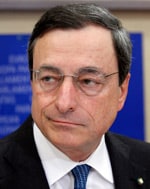NEWSMAKERS: EUROPE
by Anita Hawser
 |
|
Draghi: Will face scrutiny |
Despite attempts to block his candidacy, Bank of Italy governor Mario Draghi will become the new president of the European Central Bank (ECB) when Jean-Claude Trichet retires in October. Draghi’s candidacy initially met with opposition from France and Germany. However, in late June a meeting of EU leaders in Brussels endorsed Draghi.
Michael Ben-Gad, head of economics at London’s City University, says the Germans don’t necessarily want to be in charge of the ECB but they would have preferred the new president to come from one of the countries within the eurozone that are running budget surpluses. Italy is a “vulnerable state,” says Ben-Gad, “more so than people generally thought.” Once referred to as “the sick man of Europe,” Italy has posted weaker economic growth than some of the other eurozone countries. And, although its budget deficit is targeted at 3.9% of GDP this year, its debt is approximately 120% of GDP—not far behind Greece’s.
Ben-Gad says it is hard to tell at this stage what kind of ECB president Draghi will make but notes that whatever stance Draghi takes, the job will be difficult. “There is going to be a perception of conflict of interest. If he takes a hard line, he will be pilloried back home, and if he doesn’t take a hard line, people will accuse him of being biased. He can’t win either way.” Ben-Gad believes it would have been better with a president from one of the smaller surplus states such as Finland or the Netherlands. (The first ECB president was Dutchman Wim Duisenberg.) “[Because Draghi] is Italian, people will watch him more closely than if he was Dutch or Finnish.”
What kind of an ECB is Draghi likely to inherit? Ben-Gad says Jean-Claude Trichet will leave a central bank that is “on the hook” not only for bailing out Greece but also the other troubled eurozone countries Ireland, Spain and Portugal. “There’s this implicit belief that the ECB will intervene,” says Ben-Gad, adding that the ECB has ended up doing things that it was not initially meant to do.



